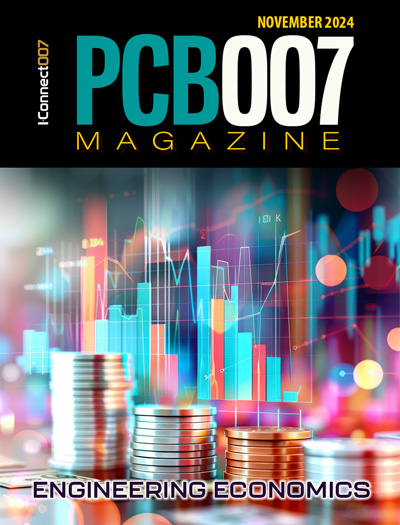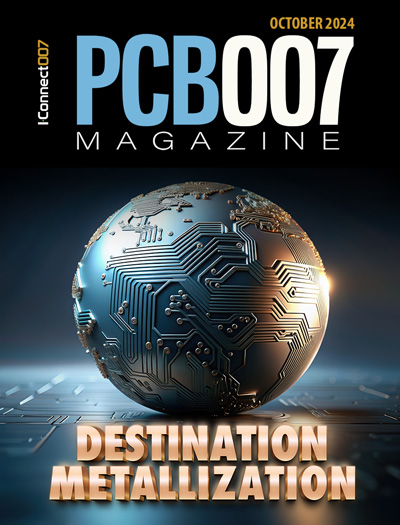-

- News
- Books
Featured Books
- pcb007 Magazine
Latest Issues
Current Issue
Inner Layer Precision & Yields
In this issue, we examine the critical nature of building precisions into your inner layers and assessing their pass/fail status as early as possible. Whether it’s using automation to cut down on handling issues, identifying defects earlier, or replacing an old line...

Engineering Economics
The real cost to manufacture a PCB encompasses everything that goes into making the product: the materials and other value-added supplies, machine and personnel costs, and most importantly, your quality. A hard look at real costs seems wholly appropriate.

Alternate Metallization Processes
Traditional electroless copper and electroless copper immersion gold have been primary PCB plating methods for decades. But alternative plating metals and processes have been introduced over the past few years as miniaturization and advanced packaging continue to develop.
- Articles
- Columns
Search Console
- Links
- Media kit
||| MENU - pcb007 Magazine
SEMI Energy Collaborative Releases Recommendations for Expanding Low Carbon Energy in Taiwan
October 16, 2024 | SEMIEstimated reading time: 2 minutes
SEMI, the global industry association representing the semiconductor and electronics design and manufacturing supply chain, released a report by its Energy Collaborative (EC) with recommendations on expanding low-carbon energy (LCE) availability in Taiwan. The report explores existing Taiwan energy policies and offers solutions to address the market’s unique LCE procurement challenges. The EC report series on LCE availability includes recommendations for Japan and South Korea.
According to the Semiconductor Climate Consortium (SCC), substantially scaling LCE investment and installation offers the most effective path for the industry to address customer expectations and pursue decarbonization targets. EC analysis suggests that more diverse procurement mechanisms and a higher level of cost-competitive LCE supply is required to prevent Taiwan’s corporate energy users from falling 30 to 50 percent short of their voluntary 2030 LCE adoption targets.
The EC has identified four key areas of LCE policy-related actions for Taiwan. Each recommendation is supported by detailed analysis of current and historical market conditions. In summary, the EC recommends:
- Expanding procurement options by introducing mechanisms such as green tariffs and unbundled renewable energy certificates
- Adjusting offshore wind localization requirements and, for offshore wind auctions, finding a balance with selection criteria such as cost, delivery timelines, and execution capabilities
- De-risking power purchase agreements (PPAs) by redefining sell-back mechanisms for surplus electricity, especially for offshore wind
- Evaluating effectiveness of offshore wind credit risk guarantees and consider extending the guarantee period - Alleviating land and community negotiation risks by enhancing the government’s role in land condition validation and creating guidelines on community benefit sharing.
“The EC welcomes recent energy policy developments in Taiwan that have gone into effect following our engagement meetings,” said Mousumi Bhat, VP of Sustainability at SEMI. “We are encouraged by the revised auction rules designed to improve cost competitiveness and timely delivery. The EC and our members look forward to further engagement with developers, financiers and government agencies in support of this critical market for our industry.”
Other regional LCE policies reviewed in phase one of the SEMI Energy Collaborative Initiative include South Korea, Japan, Singapore and Malaysia, all key regions for semiconductor industry manufacturing. Each report leverages this comprehensive analysis and includes benchmarking information on how other regions have successfully implemented similar measures to drive LCE adoption.
The Energy Collaborative report Key Challenges and Potential Solutions for Expansion and Procurement of Low-Carbon Electricity on Taiwan is the third of five, joining the reports on South Korea and Japan. Organizations sponsoring the EC will get access to much more detailed analysis of each region.
Suggested Items
SEMI Energy Collaborative Releases Recommendations for Growing the Supply of Low Carbon Energy in Japan
09/03/2024 | SEMISeeking to bolster global semiconductor value chain efforts to lower greenhouse gas (GHG) emissions, the industry association SEMI released today an analysis by its Energy Collaborative (EC) of current and forecasted low-carbon energy (LCE) markets for Japan, the second in a series of market-specific reports.
SEMI Energy Collaborative Releases Analysis and Recommendations for Increasing Supply of Low Carbon Energy in South Korea
08/12/2024 | SEMIIn an effort to help the global semiconductor value chain lower greenhouse gas (GHG) emissions, the industry association SEMI released today its first region-specific analysis of current and forecasted low-carbon energy (LCE) markets for South Korea.
SEMI, Energy Collaborative Sponsors Meet with South Korea MOTIE Officials to Present Recommendations on Expanding Renewable Energy
06/04/2024 | SEMISEMI, the industry association serving the global electronics design and manufacturing supply chain, as part of its Energy Collaborative (EC) Initiative, and EC Sponsors met with South Korea’s Ministry of Trade, Industry and Energy to discuss the EC analysis, recommendations and solutions to expanding access of the region’s semiconductor ecosystem to renewable energy – a critical factor for the South Korea chip supply chain to meet its net zero goals.
Symposium on Counterfeit Parts & Materials Program Finalized
05/08/2024 | SMTAThe SMTA is pleased to announce the technical program for the Counterfeit Parts & Materials Symposium. Co-organized by SMTA and the Center for Advanced Life Cycle Engineering (CALCE), the event will be held June 25-27, 2024 in Hyattsville, Maryland at the College Park Marriott Conference Center.
Symposium on Counterfeit Parts and Materials Program Finalized
06/16/2021 | SMTAThe SMTA and the Center for Advanced Life Cycle Engineering (CALCE) have announced the 2021 technical program for the annual Symposium on Counterfeit Parts and Materials is finalized.


